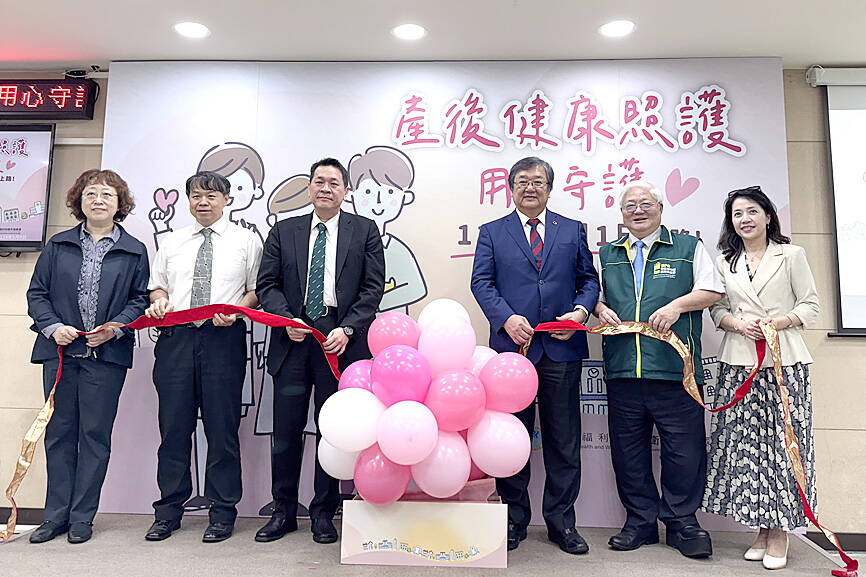A government-subsidized program for women’s checkups and medical services after childbirth has been available since May 1 to better support mothers, the Ministry of Health and Welfare said.
Taiwan Association of Obstetrics and Gynecology secretary-general Huang Chien-pei (黃建霈) on Friday said doctors in clinics have been seeing an increase in advanced maternal age women and more risks in their pregnancies.
More than 50 percent of deaths related to pregnancy and childbirth occurred within 10 days after giving birth, and more than 70 percent of those were deemed as preventable, Huang cited US medical authorities as saying.

Photo: Chiu Chih-jou, Taipei Times
“If we ignore the fatality rate in the postpartum period, then we are giving up on women who are willing to undergo pregnancy and childbirth,” he said. “That is not right.”
“We have a ministry program in place for 14 prenatal medical checks, but postpartum medical services have been neglected for too long,” Huang said.
Under the new program, health authorities subsidize funding for two postpartum health checkups, following the “fourth trimester” concept, or the first three months after childbirth, he said.
“We are changing Taiwan’s traditional ‘one month rest and recuperation’ period for postpartum mothers to enhance postpartum healthcare and medical services,” Huang said.
“It is also helps reset the body to a healthy state to prepare it for the next pregnancy and is critical in preventing chronic illnesses,” he added.
Taiwan Society of Perinatology chairman Shih Ching-chung (施景中) said obstetricians would start tracking women’s health conditions at the start of pregnancy and record illnesses or symptoms they experience, as those might not disappear after childbirth.
Checkups are usually made six weeks after giving birth, but postnatal depression could occur earlier, Shih said.
“We have found some postpartum mothers were under physical and mental stress, and would break down before going in for a checkup after six weeks,” he said.
“Some parents were also unable to care for and handle babies with genetically inherited illnesses, and due to being unaware, it led to neglect or abuse and eventually tragedy,” Shih added.
“Therefore, earlier medical intervention can help stabilize the family and assist parents in caring for the baby,” he said.
National Health Insurance Administration (NHIA) officials said mothers can go to hospitals and medical centers included in the subsidized programs for their checkups, and recommended that they do so in two stages: one or two weeks after childbirth and then another between six to eight weeks.
The checkups include weight and blood pressure checks, examining for pregnancy-related illnesses, checking urinary and pelvic functions, and assessing mothers’ mental health using the Edinburgh Postnatal Depression Scale, NHIA officials said, adding that they could be transferred to specialized centers for further checks if needed.
The first checkup would also educate mothers on sleep, chronic illnesses and the dangers of smoking, while the second checkup would involve a consultation on fitness, nutrition and sexual activity, and give advice on contraception or preparing for another pregnancy, officials said.

The manufacture of the remaining 28 M1A2T Abrams tanks Taiwan purchased from the US has recently been completed, and they are expected to be delivered within the next one to two months, a source said yesterday. The Ministry of National Defense is arranging cargo ships to transport the tanks to Taiwan as soon as possible, said the source, who is familiar with the matter. The estimated arrival time ranges from late this month to early next month, the source said. The 28 Abrams tanks make up the third and final batch of a total of 108 tanks, valued at about NT$40.5 billion

Two Taiwanese prosecutors were questioned by Chinese security personnel at their hotel during a trip to China’s Henan Province this month, the Mainland Affairs Council (MAC) said yesterday. The officers had personal information on the prosecutors, including “when they were assigned to their posts, their work locations and job titles,” MAC Deputy Minister and spokesman Liang Wen-chieh (梁文傑) said. On top of asking about their agencies and positions, the officers also questioned the prosecutors about the Cross-Strait Joint Crime-Fighting and Judicial Mutual Assistance Agreement, a pact that serves as the framework for Taiwan-China cooperation on combating crime and providing judicial assistance, Liang

A group from the Taiwanese Designers in Australia association yesterday represented Taiwan at the Midsumma Pride March in Melbourne. The march, held in the St. Kilda suburb, is the city’s largest LGBTQIA+ parade and the flagship event of the annual Midsumma Festival. It attracted more than 45,000 spectators who supported the 400 groups and 10,000 marchers that participated this year, the association said. Taiwanese Designers said they organized a team to march for Taiwan this year, joining politicians, government agencies, professionals and community organizations in showing support for LGBTQIA+ people and diverse communities. As the first country in Asia to legalize same-sex

MOTIVES QUESTIONED The PLA considers Xi’s policies toward Taiwan to be driven by personal considerations rather than military assessment, the Epoch Times reports Chinese President Xi Jinping’s (習近平) latest purge of the Chinese People’s Liberation Army (PLA) leadership might have been prompted by the military’s opposition to plans of invading Taiwan, the Epoch Times said. The Chinese military opposes waging war against Taiwan by a large consensus, putting it at odds with Xi’s vision, the Falun Gong-affiliated daily said in a report on Thursday, citing anonymous sources with insight into the PLA’s inner workings. The opposition is not the opinion of a few generals, but a widely shared view among the PLA cadre, the Epoch Times cited them as saying. “Chinese forces know full well that